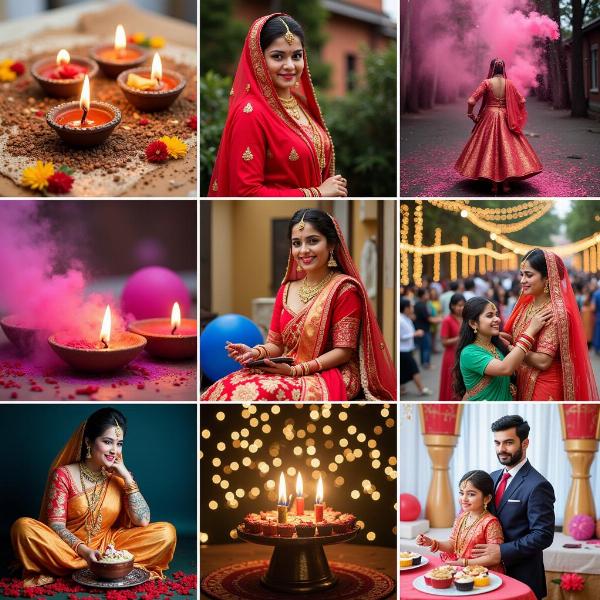Understanding the Hindi meaning of “occasion” can be tricky, as there isn’t one single perfect translation. The meaning depends on the specific context and nuance you want to convey. This article will explore the various Hindi words used to translate “occasion,” helping you choose the most appropriate term for your needs. We’ll also delve into the cultural significance of occasions in India, highlighting how language reflects these rich traditions.
Understanding the Nuances of “Occasion” in Hindi
“Occasion” in English can refer to a specific event, a favorable opportunity, or a particular time. Each of these meanings has a corresponding translation in Hindi. Let’s explore some of the most common Hindi words used for “occasion”:
-
अवसर (Avsar): This is perhaps the closest equivalent to “occasion” in the sense of a favorable opportunity or chance. For instance, “This is a great occasion to learn something new” would translate to “यह सीखने का एक अच्छा अवसर है (Yah seekhne ka ek achha avsar hai).”
-
मौका (Mauka): Similar to “avsar,” “mauka” also refers to an opportunity, often implying a chance to do something specific. The sentence, “I didn’t get an occasion to speak to him,” could be translated as “मुझे उससे बात करने का मौका नहीं मिला (Mujhe usse baat karne ka mauka nahin mila).”
-
समय (Samay): This word means “time” and can be used in the context of a specific point in time or a period. For example, “on this occasion” could be translated as “इस समय (Is samay).”
-
प्रसंग (Prasang): This word is more suited to the context of a particular topic, subject, or circumstance. If you are talking about the occasion of a festival, “prasang” might be a suitable choice.
-
उत्सव (Utsav): This word specifically refers to a festival or celebration. So, if the “occasion” you’re referring to is festive, “utsav” is the perfect choice.
How to Choose the Right Hindi Word for “Occasion”
The best way to choose the right Hindi word for “occasion” is to consider the specific context. Are you talking about a chance to do something? A particular time? A festive event? Asking yourself these questions will help you narrow down the choices.
- For Opportunities: Use “avsar” or “mauka.”
- For Specific Times: Use “samay.”
- For Topics or Circumstances: Use “prasang.”
- For Festivals and Celebrations: Use “utsav.”
The Cultural Significance of Occasions in India
India is a land of festivals and celebrations. Occasions, both big and small, are deeply woven into the fabric of Indian culture. From religious festivals like Diwali and Holi to personal milestones like weddings and birthdays, each occasion is marked with unique rituals and traditions. This rich tapestry of celebrations is reflected in the diverse vocabulary used to describe them.
What are Some Common Occasions Celebrated in India?
India celebrates a vast array of occasions, reflecting the country’s diverse religious and cultural landscape. Some of the most prominent include:
- Diwali: The festival of lights, celebrating the victory of good over evil.
- Holi: The festival of colors, marking the arrival of spring.
- Eid: Celebrating the end of Ramadan, the Islamic holy month of fasting.
- Christmas: Celebrating the birth of Jesus Christ.
- Weddings: Elaborate ceremonies marking the union of two families.
- Birthdays: Celebrating the anniversary of a person’s birth.
 Common Indian Occasions
Common Indian Occasions
Conclusion
Understanding the Hindi meaning of “occasion” requires considering the specific context. While “avsar,” “mauka,” “samay,” “prasang,” and “utsav” are common translations, the most appropriate choice depends on the nuance you want to convey. By understanding these nuances, you can communicate more effectively and appreciate the rich cultural significance of occasions in India. Remember that the best way to master these words is to use them in context and observe how native Hindi speakers use them.
FAQ
-
What is the most common Hindi word for “occasion”? “Avsar” and “mauka” are the most common and generally applicable.
-
Can I use “samay” for any occasion? “Samay” is better suited when referring to a specific time or period rather than an event itself.
-
When should I use “utsav”? Use “utsav” specifically for festivals and celebrations.
-
What is the difference between “avsar” and “mauka”? While both refer to opportunities, “mauka” often implies a specific chance to do something.
-
How can I learn more about Indian culture and occasions? Explore resources online, read books, and interact with people from India.
-
Is there a formal and informal way to say “occasion” in Hindi? The words presented here are generally acceptable in both formal and informal contexts, but the specific choice will depend on the overall tone of the conversation.
-
How do I know which word is best for a specific situation? Paying close attention to the context and the specific type of occasion being discussed is key to choosing the correct Hindi word.
Meaning-Hindi.in is your one-stop solution for all your Hindi translation needs. We specialize in a wide range of translation services, from business and legal documents to technical manuals and website localization. We also offer quick turnaround times for urgent projects and expertise in specialized fields. Our team of experienced translators is dedicated to providing accurate and culturally sensitive translations that meet the highest standards of quality. Contact us today for a free quote at [email protected] or call us at +91 11-4502-7584. Meaning-Hindi.in is committed to bridging the language gap and connecting you with the world.